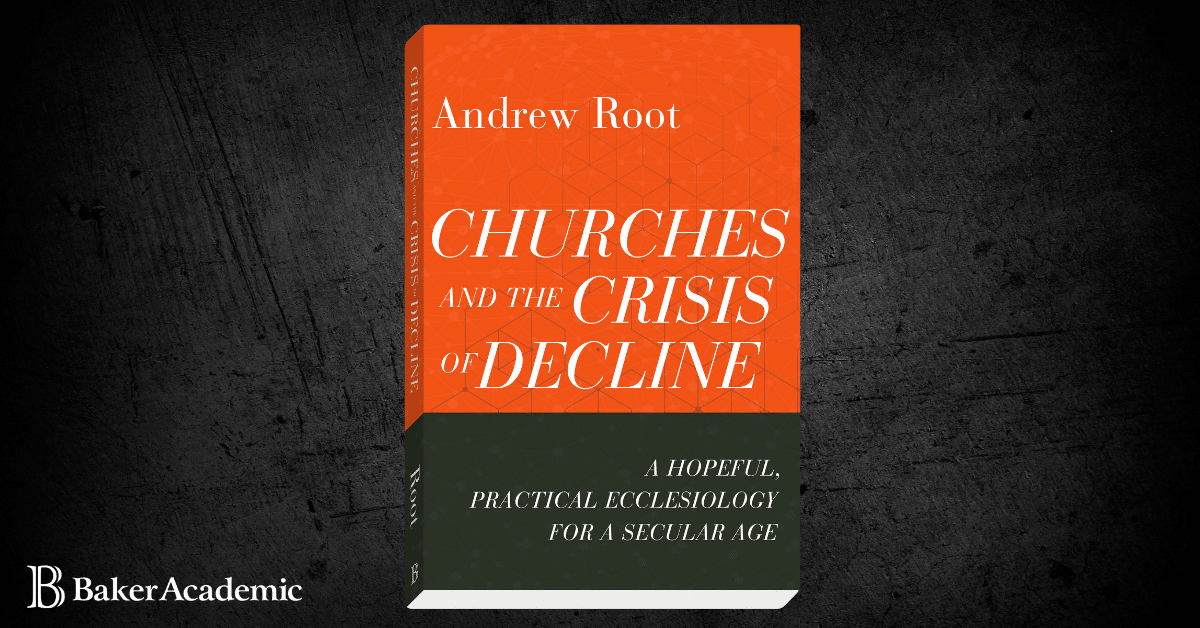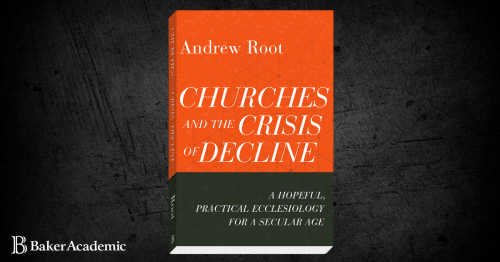

CHURCHES AND THE CRISIS OF DECLINE: A Hopeful Practical Ecclesiology for a Secular Age. By Andrew Root. Grand Rapids, MI: Baker Academic, 2022. Xii + 287 pages.
Is the church experiencing a crisis of decline? The evidence would seem to support that conclusion. Whether it’s denominational attendance/membership reports or the latest polls, people aren’t going to church like they once did. Many of our churches, including the churches I’ve served over the years, are aging and there are few signs that younger cohorts will come to the rescue. Even congregations that seem to be vital, worry about the future. While mainline Protestant churches have been in decline for several decades, recent studies suggest that even more conservative congregations and denominations that once seemed impervious to the threat of decline are experiencing signs of decline.

Robert D. Cornwall
I was born into the church, and I’ve spent a significant portion of my adulthood in some form of pastoral ministry. Before my retirement in July 2021, I had served as the pastor of three small congregations (all of which had less than 100 members). Two of those Disciples of Christ congregations are located in California, with the one from which I retired located in Michigan. You might say that I’ve invested my life in the church, so I have skin in the game when it comes to conversations about the state of the church in the twenty-first century. I share the concern of many about the future of the institutional church, though I take to heart Jesus’ promise to Peter that he would build the church on the rock of Peter’s confession, and that “the gates of Hades will not prevail against it” (Mt. 16:18). You might say that the gates of Hades have been knocking on the door of the church. Consider the challenge that the COVID pandemic has placed on the church. While things might be opening up, we’re still not back to the way things were before COVID. The likelihood is that they’ll never be the same. Besides COVID we have an increasingly volatile political/cultural context that has enveloped the church at large and seems to be turning off an entire generation from the message of Jesus or at least the church as the embodiment of that message. Now, I’ve contemplated ways in which we can address the crisis. I’ve written several books that address these concerns, including one suggesting that spiritual gifts can be a key to empowering believers to do the work of ministry (see my book Unfettered Spirit: Spiritual Gifts for the New Great Awakening (Second Edition). But the crisis remains with us, and likely will for the foreseeable future. So where might we find a word of hope in the midst of what is becoming an increasingly secular age (no, returning prayer to our public schools isn’t the answer!).
While I don’t envision a building boom like the one that took place in the 1950s when denominations and congregations couldn’t up with the inundation of new folks. Many of those new buildings were put up just as the first signs of decline began to set in during the mid to late 1960s. Nevertheless, if the gates of Hades won’t prevail, what might be the prognosis for the church as it navigates this increasingly secular age? What might the church look like going forward?
Andrew Root, the Carrie Olson Baalson Professor of Youth and Family Ministry at Luther Seminary, has devoted significant attention to the question of what the church might look like as it experiences the current secular age. His book series Ministry in a Secular Age has now reached four in number, with the latest contribution being the aptly titled Churches and the Crisis of Decline: A Hopeful, Practical Ecclesiology for a Secular Age. As with the earlier books in the series, Root draws on the work of Canadian philosopher Charles Taylor, who is known for his book The Secular Age (Harvard University Press, 2007). Root focuses his attention on how the church experiences what he calls the “immanent frame.” He writes that “It is easier to conceive of God only as a flat concept—a kind of final contingent relation behind the curtain of all explanations—than to conceive of God as an acting and speaking agent in the world. It’s difficult inside this framework to live as though God is ever present and ever active in each and every one of the contingent relations that make up our lives.” (p. 11). In other words, we have jettisoned transcendence in favor of immanence, closing our world off from any actor outside the immanent frame. While I’m a believer in science and scientific explanations, at times I feel as if we have become so beholden to natural law that we’ve reduced God to a passing notion on a Sunday morning, such that ultimately everything depends on us.
Karl Barth plays a central role in Root’s book, with a focus on Barth’s time as a pastor at Safenwil. This is a period of Barth’s life before he joined the academic world that produced the Church Dogmatics. It is during this period that Barth became involved in Socialist politics as he took the side of the workers in the community of Safenwil and came to reject the liberalism and nationalism of his teachers, including Adolph Von Harnack during World War I. It is during this period that he wrote his commentary on Romans. It was while serving as a pastor during a period of crisis in Europe that he discovered that the God who is God is the only hope for the church and that this God is revealed in Jesus. The path that he discovered was dialectical in nature, such that the transcendent God enters the immanent frame in Jesus. Contributing to Barth’s discovery of this dialectic was his encounter with Christoph Blumhardt and through him Blumhardt’s father Johann Christoph Blumhardt, who was known for his healing ministry. While the Blumhardts were rooted in pietism, they found a path that wasn’t bound by a narrowly inward pietism but instead allowed for engagement with the world. In fact, Christoph Blumhardt, like Barth, was a socialist, so he was engaged in the world. But, he understood that it is God who is God that needs to act in the world.
While Barth provides the theological foundation to the book, Root creates also creates a story that involves what appears to be a small, dying congregation. This congregation was seeking to figure out what the future after it had called a dynamic young man to serve as its pastor. This young pastor promised to turn things around by creating something new and different that would attract a younger audience. While the church was known as Saint John the Baptist Church, he changed the name to Thrive. This young pastor—Luke—was energetic and entrepreneurial but he also brought a conservative theology unlike that of the congregation. While the church hoped that it might thrive with Luke’s leadership ultimately things didn’t mesh, and Luke moved on from Saint John the Baptist Church. In doing this, he left the church reeling from their experiment. Having tried something out of the box (at least for them), they weren’t sure what to do next. Root introduces us to a small group of church members, including several leaders of the congregation, who were wondering whether they should call a new pastor or simply shut down. It’s a question many smaller, aging congregations are asking. It is into this context that a young man named Woz shows up. One day he shows up at the Bible study because his beloved grandmother told him on her death bed that he needed to find God. Since his grandmother had been part of this Bible study, he decided to go to them in his search for God. In fact, he asked this group point-blank to help him find God. He assumed that they knew God and could help him. As for the group, they weren’t so sure. Nevertheless, one of the leaders of the church agreed to the quest. While they weren’t sure how they would do this, they began a journey to help Woz find God and while doing so they had their own encounters with God. In the course of their journey together they discovered something Barth had discovered decades earlier while serving as a pastor in a Swiss village. That is, while we can’t find God, God can find us. So, they agreed to wait with Woz as he waited for God to find him. It is this waiting for God that is the key to finding a path for the church in this secular age. It is something that Barth discovered as a result of his encounter with Christoph Blumhardt. While it’s not easy to wait, and yet Root believes, following Barth that this is the only way to stem the tide of decline in the church.
I’ve read several of Root’s recent books and I have found them to be intriguing and provocative. They can also be a bit dense at times, so it requires some careful reading to discern the message. However, it is worth the effort. While I have not read Charles Taylor’s works on the secular age, I know that Taylor has influenced several writers dealing with the state of the church in the modern world. Root draws deeply on Taylor’s analysis, and what Root has to say using Taylor’s work makes sense. As I read Churches and the Crisis of Decline, I thought about my own points of departure. I’ve long found Barth to be a helpful theological companion. He might push the dialectic further than I might, but I find his view of the transcendent God who reaches out to us through Christ compelling. At the same time, I’ve found the message of Open and Relational Theology helpful. While I have embraced elements of Open and Relational Theology, especially its open view of the future, as I read Root’s book, I began to discern that Open Theology tends to be bound by the immanent frame. Therefore, it tends to limit God’s activity in the world to our own actions. So, I wonder if bringing Barth’s view of God being God into the conversation might prove to be a necessary correction. Whether you are a fan of Barth or not there is something compelling about the early Barth that is worth considering. Maybe we need to start waiting for God, rather than trying to get ahead of God as we seek to respond to this secular age.
One of the messages that I discerned from Root’s story about Saint John the Baptist church concerns the question of relevance. It seems as if “relevance” and “authenticity” are important buzzwords of our day, but what is relevance? St. John the Baptist tried to become “contemporary” but was it true to itself? Was Thrive an authentic version of that congregation’s identity? I believe that change is necessary for the church to advance. I’ve advocated for change and made changes as a pastor, but too often we seem to be chasing a vision of relevance that is illusory. So, perhaps we need to wait for God who is God to act if we are to navigate this secular age while being faithful to our calling. Interestingly, as Root tells the story of the relationships that emerged between Woz and the older members of this congregation, he not only encountered God, but that congregation found a new sense of identity and life in the presence of God. It might not become a large congregation, but it found its purpose. Root writes “Saint John the Baptist didn’t have the resources and relevance they once thought they needed. But they now had something more. They had encountered the revelation of the living God, who called them to wait. This waiting prepared them for direct encounter with personal agents such as Woz who were unveiled in the incognito of the God who is God. Saint John the Baptist was a church that was now alive because it was a church encountering a lived transcendence” (p. 282).
While Root’s story about Saint John the Baptist Church might be fictional, perhaps it encapsulates a vision for the church that will enable the church in all its forms to discover its true identity by encountering the God who is God who is revealed in Jesus. With that in mind, I believe that Andrew Root’s Churches and the Crisis of Decline can help us traverse this difficult terrain that is the immanent frame. That is where we will find a “hopeful, practical ecclesiology.”
This review originally appeared on BobCornwall.com.
Robert D. Cornwall is an ordained minister in the Christian Church (Disciples of Christ). Now retired from his ministry at Central Woodward Christian Church (Disciples of Christ) of Troy, Michigan, he serves as Minister-at-Large in Troy. He holds a Ph.D. in Historical Theology from Fuller Theological Seminary and is the author of numerous books including his latest books: Called to Bless: Finding Hope by Reclaiming Our Spiritual Roots (Cascade Books, 2021) and Unfettered Spirit: Spiritual Gifts for the New Great Awakening, 2nd Edition, (Energion Publications, 2021). His blog Ponderings on a Faith Journey can be found at www.bobcornwall.com.






